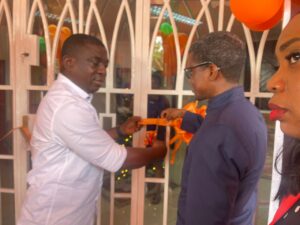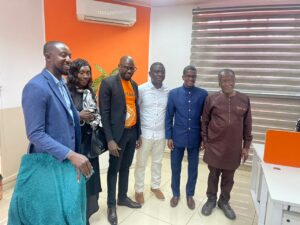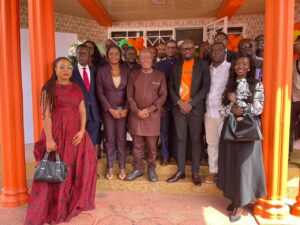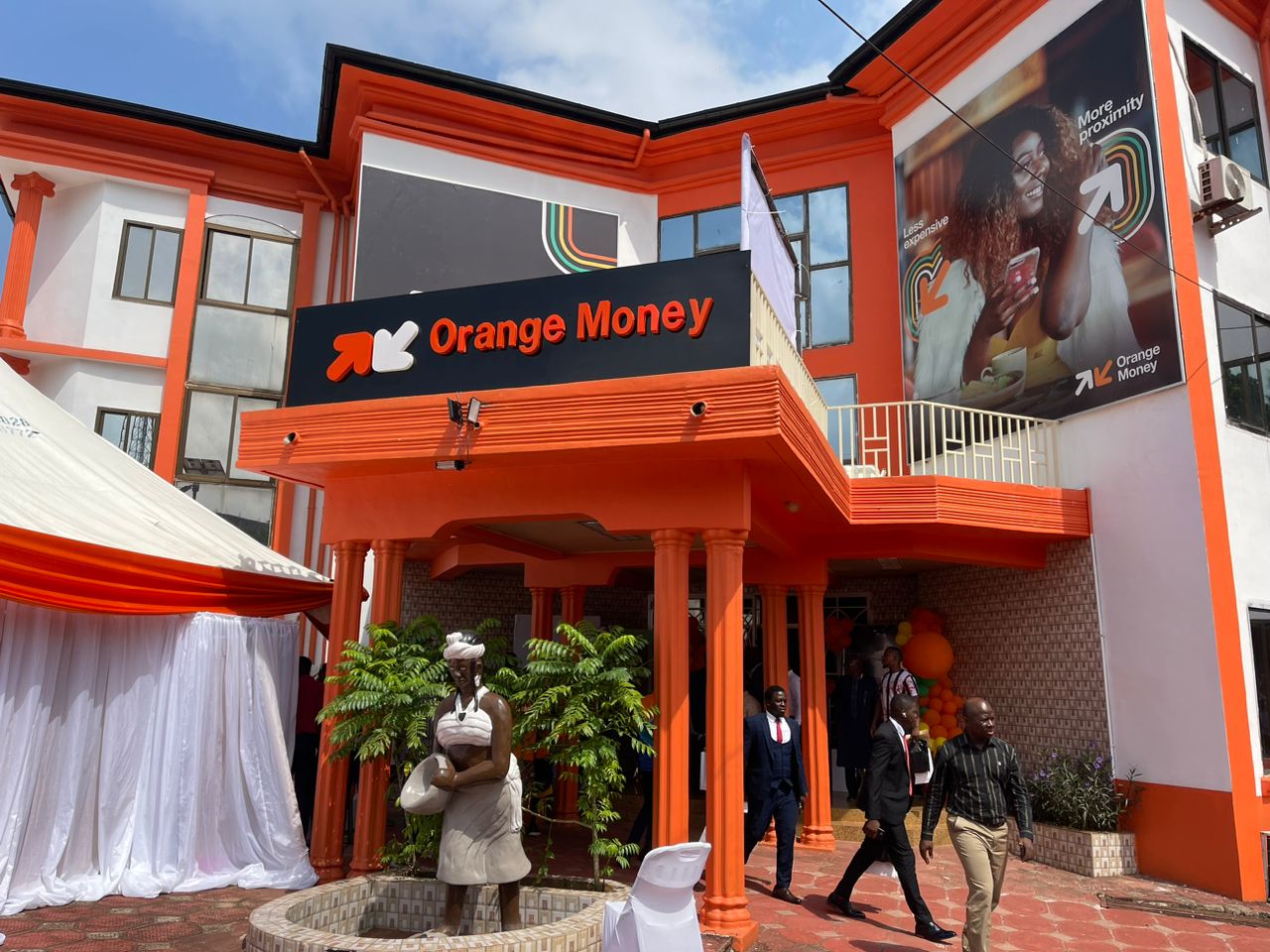A beautiful edifice has been put up at Hill Station for Orange Money staff, administrators and managers. It is a big leap as Orange Money strives to take the lead in digital financial services in Sierra Leone. Orange Money has ensured that lives have been touched and a difference created, and impact made since it began operation in Sierra Leone in 2018.
The new building, a symbol of Orange Money autonomy, was commissioned on Tuesday 13th December, 2022. The commissioning ceremony tagged ‘Open Ose’ was attended by a battery of dignitaries from different walks of life including the Director-General of National Telecommunications Commission (NATCOM).
In his address at the occasion, Chief Executive Officer (CEO), Orange Money, David Mansaray said the new building was a fulfillment of a long held dream. It was his vision to cement a financial gap that brought him into the telecoms industry after serving the banking industry for 15 years. “I saw a huge gap within the financial sector. Banks’ presence in the country is low and access to finance is limited. It was ven difficult for banks to have branches in the country since it was not cost-effective owing to low savings,” CEO Mansaray recounted.
Too much procedures in setting financial institutions and low levels of literacy, he went on, worsened and dampened access to finances hence the need to come up with innovations to solve the problems. ” Many people People do not have bank accounts, but have mobile phones. It was therefore easy and necessary to have a touch-point where money could be transferred from point to another. A huge opportunity was therefore tapped,” he stressed. To actualise the dream, a system of digital money transfer was created, and operationalised.
But, trust was also a major factor in the digital financial business. People still transferred money through envelops even when mobile money was in operation.
“There was need for trust as people must believe that their money is safe,” Mansaray told the audience. Visibility factor, he said, was also vital in the digital money services: customers should locate an Orange Money shop to do business.
A public education scheme, he continued, was also initiated to ensure that customers were equipped with the requisite knowledge on how to operate Orange Money. Orange Money accomplished all those programmes owing to the vision of reaching every household in Sierra Leone. The company also embarked on recruitment and training schemes to make Orange Money workable.
“We expand distribution network, embark on massive recruitment of agents and provide training for them,” CEO Mansaray informed the audience. To achieve better results, Orange Money saw the need to partner with banks and big financial institutions.

11 banks have been partnered with evidenced by the Bank-to-Wallet and Wallet-to-Bank services. The service enables customers to deposit money in their bank accounts and also withdraw money using the same model.
One the most productive relationships the company went into was the UNCDF (United Nations Capital Development Fund). Through the UNCDF partnership, 2, 000 (two thousand) female agents were trained, and 1, 700 (one thousand, seven hundred) retained adding to the existing 12, 000 (twelve thousand). Prior to the UNCDF partnership, Orange Money had only 300 female agents. In August this year,
Orange Money also signed a Memorandum of Understanding with the Bike Riders Union which saw the setting up of Orange Money shops in several ‘OKada’ parks across the country. University remittances and ‘Lajor’ programmes were also introduced.
Through their partnership with Empire Solutions. Under the ‘Lajor’ Programme, customers can access Orange Money loans within five minutes with the use of a mobile phone. “We want to bring everyone on board,” the CEO assured. Orange Money, over a month ago, launched a new app that connected non-Orange Money customers.


With the new app, those who are not Orange Money clients can access Orange Money services using other networks. Mansaray singled out Koinadugu as an example of a district where people used to pay Le 50, 000 (fifty thousand Leones) to access money, and that with the advent of Orange Money, the challenges were made history.
Although Sierra Leone’s financial inclusion rate is still below 30 percent, Mansaray assured that strategies were being put in place to improve on the figure. For the CEO, a lot has been achieved in the Digital finance services, and the result is here. He appreciates his predecessors’ work as well as Bank of Sierra Leone (BSL) and NATCOM for creating a friendly regulatory environment.
Sekou Amadu Bah is the CEO for Orange Sierra Leone. He informed the audience that the new building meant independence for Orange Money. He however urged the Orange Money head to comply with the laws and regulations on digital money. CEO Bah also called for a strong Eco-system of financial digital services for the people of Sierra Leone.
Orange Money, he went on, was incorporated into Orange Sierra Leone (OSL) as part of the company’s strategies of digital financial services. He however does not lose sight of a large number of those who do not have access to finance. “For millions, access to money is still a dream,” he said citing social status, geographical extent and irregular incomes as the main causes.
The OSL CEO tagged the statistics of those without access to money at 70 per cent and 75 per were women. The figures add to the 1.7 billion people globally whose access to money is still a challenge. “To deliver a sustainable Orange Money scheme, those who have been left out must be reached,” he added.
He however stated that the Orange Money programme, the largest digital operator, has lifted many from a condition of abject poverty especially low-income earners. In his contribution, Bank governor of Sierra Leone, Professor Kelfallah Kallon told the audience that entrepreneurship was the foundation of development, and that is what mobile companies had been doing.
The coming of private mobile companies, he said, ended monopoly in the telecoms industry and contributed to national development. “Before now, Sierratel was happy as it was the only telecoms company operating in Sierra Leone. There was competition when other companies came into the industry,” Prof Kallon recounted. The Bank governor also spoke about companies which had been doing business and amassing huge profits without giving back to society. Orange Sierra Leone, he went on, was however an exception.
The company has won awards for its vibrant and effective corporate social responsibility and philanthropy. The implementation of key humanitarian services is the secret of the company’s strengths and success stories in Sierra Leone.
Prof Kallon called on Sierra Leoneans to support Orange Money so that it could continue to work for Sierra Leoneans citing the East African country of Zambia as an example of where every business transaction was done via Orange Money.
NATCOM Director-General, Daniel Kaitibie who made the keynote address was highly impressed with the achievement Orange Money has recorded so far. He sees great benefits for mobile companies to operate in Sierra Leone owing to their contribution to national development. “The telecoms sector is one that pays taxes and hires more than mining companies in Sierra Leone. That is why I always work with Bank of Sierra Leone to create a regulatory friendly environment,” he said.
The NATCOM Director-General went on to state that he did almost all his money transactions via Orange Money because of its multiplying effect. Mr Kaitibie also informed the audience that telecoms companies had ensured 90% coverage of the country and called on them to penetrate adding the more they penetrate the more they earn.
He promised them a good regulatory environment for the companies to continue to operate. “Under my watch, no mobile phone company will die or leave Sierra Leone like Millicom, Tigo and Comium,” he assured.
Cutting of the tape formed the high point of the occasion.


